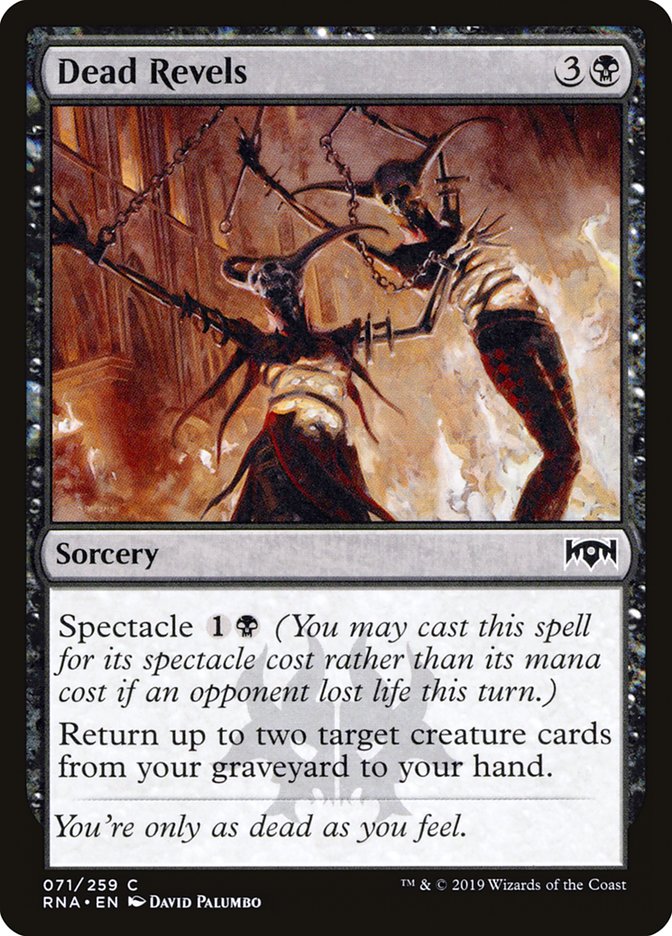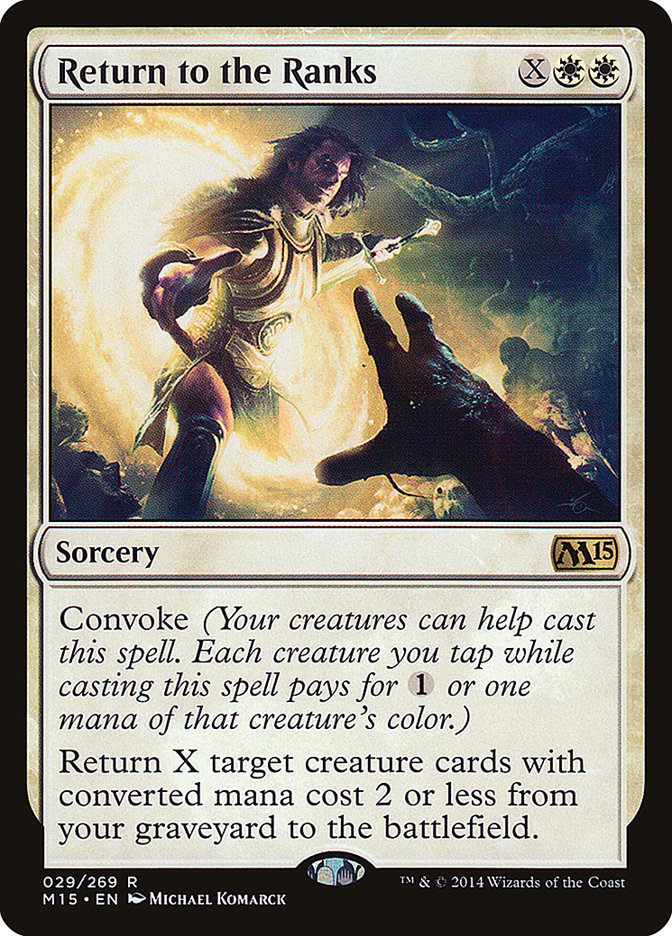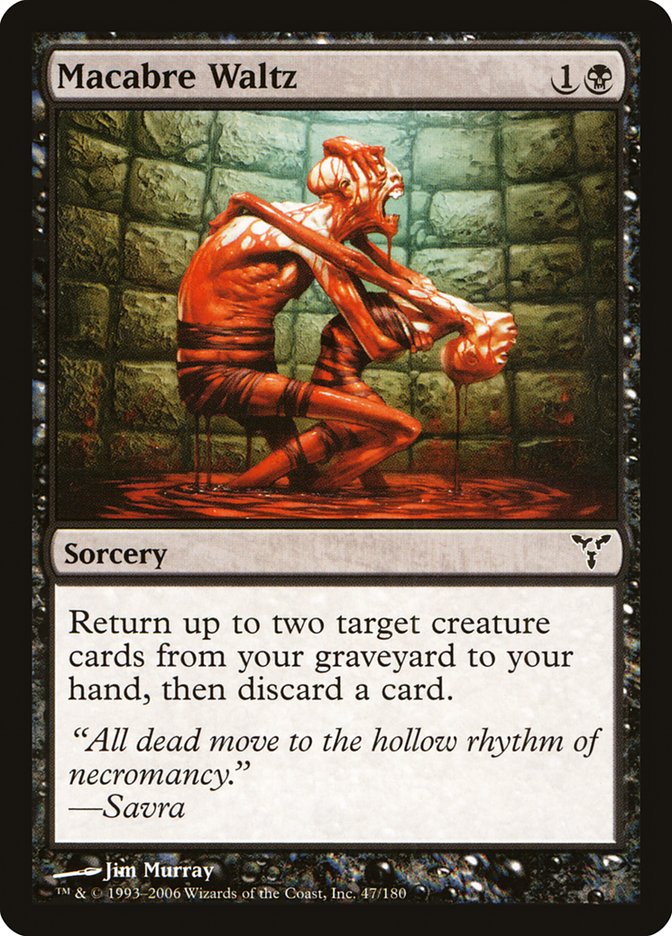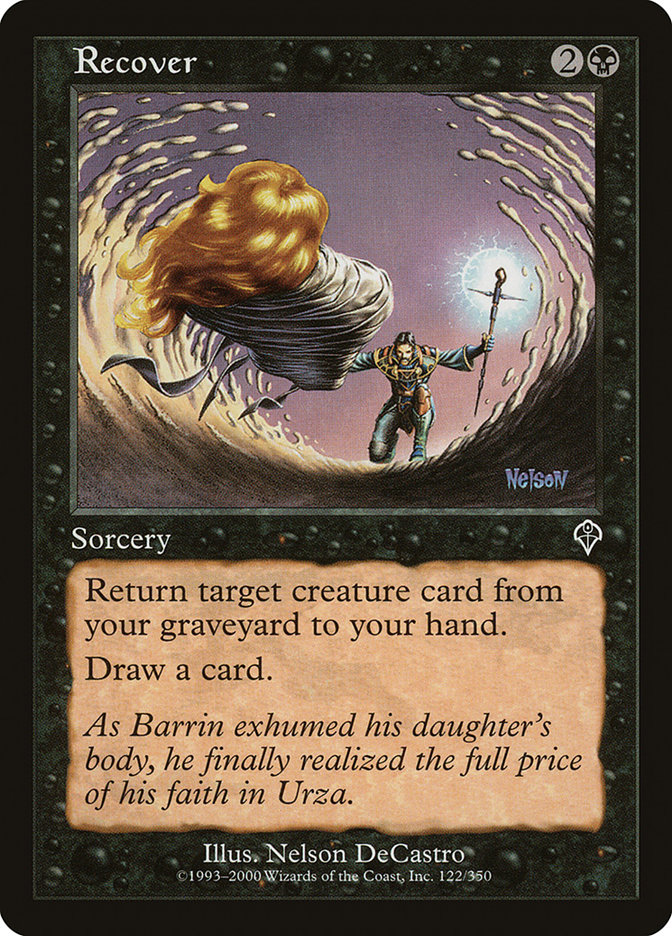Dead Revels MTG Card
| Mana cost | |
| Converted mana cost | 4 |
| Rarity | Common |
| Type | Sorcery |
| Abilities | Spectacle |
| Released | 2019-01-25 |
| Set symbol | |
| Set name | Ravnica Allegiance |
| Set code | RNA |
| Number | 71 |
| Frame | 2015 |
| Layout | Normal |
| Border | Black |
| Illustred by | David Palumbo |
Text of card
Spectacle (You may cast this spell for its spectacle cost rather than its mana cost if an opponent lost life this turn.) Return up to two target creature cards from your graveyard to your hand.
You're only as dead as you feel.
Cards like Dead Revels
Dead Revels is an intriguing piece in the puzzle of creature recursion in Magic: The Gathering. It allows players to return up to two creature cards from their graveyard to their hand, resonating with the mechanics of cards like Return to the Ranks. While Return to the Ranks can potentially bring back more creatures, it requires a more substantial mana investment and convokes as its casting cost, making Dead Revels more versatile in its standard mana cost.
In comparison, we find Macabre Waltz, which also returns creatures from the graveyard to hand. Like Dead Revels, it requires discarding a card, yet it only costs two mana and insists on returning exactly two creatures, reducing flexibility. Then there’s Recover, a single-target recursion spell that brings back one creature and draws a card. While it does not have the capacity to return multiple creatures like Dead Revels does, the card draw is a boon for continuous hand advantage.
Assessing these options makes it clear that Dead Revels has a strong position within creature retrieval cards in Magic: The Gathering. Its balance of cost-to-effect and the ability to select up to two targets offers players a versatile tool for maintaining creature presence on the battlefield.
Card Pros
Card Advantage: Dead Revels enables you to return up to two creature cards from your graveyard to your hand, effectively turning your graveyard into an extension of your hand and giving you a strategic edge over opponents by increasing your available resources.
Resource Acceleration: By efficiently utilizing creatures that have already been used or discarded, Dead Revels accelerates your gameplay, allowing you to redeploy threats without spending resources on new cards. It’s an excellent way to snowball your board presence and apply pressure.
Instant Speed: While Dead Revels is a sorcery, it can benefit from cards that change spell speeds or from graveyard-to-hand mechanics that function at instant speed, providing a flexible strategy in combination with other cards that could alter its timing. This enhances its usefulness and adaptability in various gameplay situations.
Card Cons
Discard Requirement: One limiting factor for Dead Revels is that to maximize its potential, you typically need to have a significant enough graveyard. Without creatures in the graveyard, the card may sit idle in your hand or at best underperform, which can be burdensome during tight gameplay situations.
Specific Mana Cost: Dead Revels calls for two black mana in its casting cost, which can be restrictive for multicolored decks that might struggle with mana consistency. This requirement can hinder the card’s flexibility and delay its casting, especially in decks with three or more colors.
Comparatively High Mana Cost: Dead Revels has a mana cost of four, which for a sorcery that returns only two creature cards from your graveyard to your hand, could be considered steep. Other cards available in MTG might provide more value or return more creatures to the battlefield directly for a similar or even lower cost.
Reasons to Include Dead Revels in Your Collection
Versatility: Dead Revels serves as a crucial recovery tool in decks heavy on creatures, allowing players to reclaim key pieces from their graveyard. It’s particularly adaptable as it can be cast using its spectacle cost for a reduced mana investment when an opponent has lost life this turn.
Combo Potential: This spell has strong synergies in decks that thrive on recurring creatures for value or sacrifice effects, essentially doubling the impact of each creature’s entry or exit on the battlefield. It’s a key enabler in engine-based decks seeking to loop through their creatures multiple times.
Meta-Relevance: In a game state where removal spells are frequent and creatures are quickly sent to the graveyard, Dead Revels presents an opportunity to maintain board presence and apply persistent pressure, keeping the deck’s momentum in both aggressive and attrition-based metagames.
How to beat Dead Revels
Challenging the might of Dead Revels in your MTG game requires a keen understanding of its revival strength. Known for its prowess in bringing creatures back from the graveyard to hand, it gives players a second chance to sway the battlefield in their favor. To effectively counter this, it’s essential to minimize the impact of these returning threats. Efficient graveyard hate cards, such as Rest in Peace or Relic of Progenitus, strip the game of revival opportunities by purging graveyards to nothingness.
Strategic play can also dampen Dead Revels’ potential. Opt for casting spells with exile effects rather than destroy, preventing creatures from hitting the graveyard in the first place. Cards like Path to Exile serve as prime examples of keeping your opponent’s graveyard lean, thwarting their plans to recruit past forces. Additionally, proactive counter measures, such as Negate or Dovin’s Veto, can nip Dead Revels in the bud, safeguarding the state of the game and maintaining control.
Ultimately, your arsenal to beat Dead Revels lies in preemptive actions and having the right answers at the right time to eclipse the card’s influence. By proactively managing your opponent’s graveyard or the stack, you guard your lead against the undertow of creatures Dead Revels could unleash.
Where to buy
If you're looking to purchase Dead Revels MTG card by a specific set like Ravnica Allegiance, there are several reliable options to consider. One of the primary sources is your local game store, where you can often find booster packs, individual cards, and preconstructed decks from current and some past sets. They often offer the added benefit of a community where you can trade with other players.
For a broader inventory, particularly of older sets, online marketplaces like TCGPlayer, Card Kingdom and Card Market offer extensive selections and allow you to search for cards from specific sets. Larger e-commerce platforms like eBay and Amazon also have listings from various sellers, which can be a good place to look for sealed product and rare finds.
Additionally, Magic’s official site often has a store locator and retailer lists for finding Wizards of the Coast licensed products. Remember to check for authenticity and the condition of the cards when purchasing, especially from individual sellers on larger marketplaces.
Below is a list of some store websites where you can buy the Dead Revels and other MTG cards:
 BUY NOW
BUY NOW BurnMana is an official partner of TCGPlayer
- eBay
- Card Kingdom
- Card Market
- Star City Games
- CoolStuffInc
- MTG Mint Card
- Hareruya
- Troll and Toad
- ABU Games
- Card Hoarder Magic Online
- MTGO Traders Magic Online
See MTG Products
Legalities
Magic the Gathering formats where Dead Revels has restrictions
| Format | Legality |
|---|---|
| Historicbrawl | Legal |
| Historic | Legal |
| Legacy | Legal |
| Paupercommander | Legal |
| Oathbreaker | Legal |
| Gladiator | Legal |
| Pioneer | Legal |
| Commander | Legal |
| Modern | Legal |
| Pauper | Legal |
| Vintage | Legal |
| Duel | Legal |
| Explorer | Legal |
| Penny | Legal |
| Timeless | Legal |
Rules and information
The reference guide for Magic: The Gathering Dead Revels card rulings provides official rulings, any errata issued, as well as a record of all the functional modifications that have occurred.
| Date | Text |
|---|---|
| 2019-01-25 | A card’s spectacle cost is the same no matter how much life your opponents lost or how many opponents lost life. |
| 2019-01-25 | Damage dealt to a player causes that player to lose that much life. |
| 2019-01-25 | In a multiplayer game, if an opponent loses life and later that turn leaves the game, you can cast a spell for its spectacle cost. (If a player leaves the game during their turn, that turn continues without an active player.) |
| 2019-01-25 | Spectacle doesn’t change when you can cast the card. For example, you can’t cast a sorcery with spectacle during an opponent’s turn unless another effect allows you to do so, even if that player has lost life this turn. |
| 2019-01-25 | To determine the total cost of a spell, start with the mana cost or alternative cost you’re paying (such as a spectacle cost), add any cost increases, then apply any cost reductions. The converted mana cost of the spell remains unchanged, no matter what the total cost to cast it was. |



